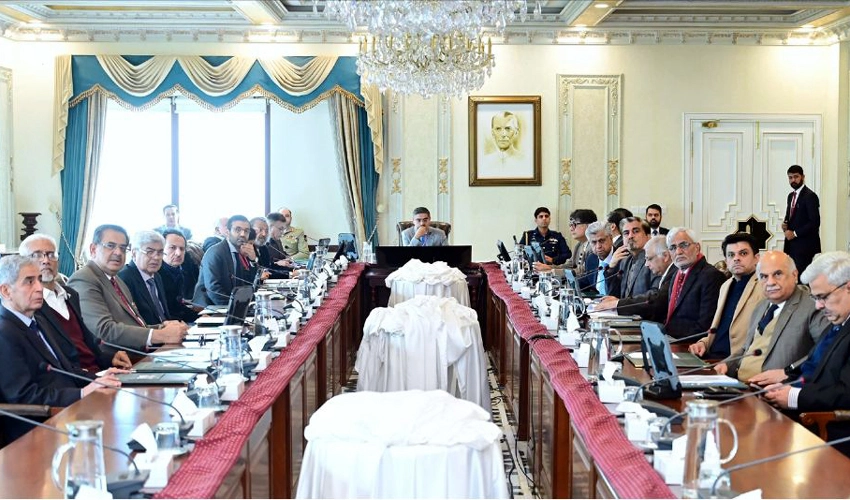Caretaker govt to carry out groundwork for FBR’s structural reforms.
IMF has recommended a fixed tenure for FBR chairman.
Restructuring of Customs is to focus on trade facilitation.
ISLAMABAD: A federal cabinet meeting presided by Caretaker Prime Minister Anwarul Haq Kakar will be held on today (Tuesday) to mull over greenlighting the Federal Board of Revenue (FBR)’s revamp and digitisation, contrary to the International Monetary Fund (IMF)’s suggestions to enhance the tax administration, The News reported.
Some startling disclosures showed that the caretaker setup has adopted a poor governance mechanism during its tenure.
The cabinet meeting’s minutes mentioned that the forum had formed an inter-ministerial body that would be convened by the finance minister with ministers of foreign affairs, privatisation, law and justice, energy, commerce, IT and telecommunications. The meeting also considered the summary submitted by the revenue division ‘Restructuring of the Federal Board of Revenue and Digitisation’. The committee was tasked with deliberating on the reform proposals and refining them for consideration by the cabinet in its next meeting.
The minutes state that the Federal Board of Revenue (FBR) shall (i) make the tax return form simple enough for the common person to understand and fill out; and (ii) reduce its length to no more than two pages, with provisions for supplementary information where required.
“Given its constitutional and legal mandate, the caretaker government would only carry out the groundwork for the Federal Board of Revenue’s structural reforms, keeping in view the public interest, but legislation to effect these reforms would be left to the newly elected government,” the official minutes of the last cabinet meeting state.
Now the question arises: if there was a futile exercise keeping in view the minutes of the last cabinet meeting, why were all energies wasted?
On the other hand, the IMF’s Technical Assistance Report on Revenue Administration Diagnostic stated that the proposals to develop the FBR into a semi-autonomous revenue authority are fully supported and encouraged.
“The IMF has recommended a fixed tenure for the chairman of the tax authority,” the report added.
The IMF has shared options to transform the FBR into a single national tax authority to administer all federal and progressively provincial taxes or restructure the FBR as a federal tax agency with coordinated linkages across all provincial tax agencies.
The IMF report, prepared by Robert Woods, an expert in the Fiscal Affairs Department of the Fund, proposed a future for the revenue authority and stated that the task force established by the government has developed different proposals to restructure the revenue administration.
The proposal options under consideration were to transform the FBR into a single national tax authority to administer all federal and progressively provincial taxes or to restructure the FBR as a federal tax agency with coordinated linkages across all provincial tax agencies.
The establishment of the tax authority as a performance-driven semi-autonomous revenue authority with its own service rules, recruitment, and management policies ultimately operating under a single-line budget.
There is a need to ensure strong governance and performance management by appointing an independent tax oversight and administration board. It recommended a fixed tenure for the head of the tax authority.
The restructuring of Customs is to focus on trade facilitation, border control, and anti-smuggling operations, either by separating the Customs from the FBR to form a customs and border control authority under the finance ministry under the oversight of its board or by establishing a single reporting head for Customs within the tax authority. The proposal to adopt digital revenue administration through electronic invoicing and a digital withholding system is also under consideration. The proposal for strengthening information technology support for digital administration is also being considered.
The caretaker finance minister has left no stone unturned to bulldose the FBR restructuring plan of her own choice and pressured it to write in the summary that the inter-ministerial extended the support of the revamp plan.
However, the FBR members insisted that they would write in the summary that there was stiff opposition to this restructuring plan incorporated in the summary to give a chance to the federal cabinet to make an informed decision. But there was pressure to show through the summary that everything was okay.
The FBR made it clear that they would only send the summary once they received the minutes of the last cabinet meeting. How could they comply with the verbal orders without having read the last minutes of the meeting?
On Monday evening, the FBR received the official minutes of the last Federal Cabinet meeting, in which an inter-ministerial committee was constituted to further deliberate on the summary for the FBR restructuring.
Earlier, the secretary of revenue/chairman of the FBR had refused to prepare and forward another summary without getting the official minutes of the last cabinet meeting.
Deliberate efforts were going on to convince the law minister to withdraw his comments on the inability of the caretaker government to make massive legislation under which the government had to bring 1010 changes to the existing tax laws.
This Inter-Ministerial Committee proved another fiasco because none of the caretaker ministers except Ejaz Gohar had supported the FBR revamp idea. However, Gohar had also raised the question of massive under-invoicing in the official meeting. There were the fewest reform proposals given by the minister of foreign affairs, but he had also proposed three to four recommendations to implement them to improve tax efficiency.
The energy minister had proposed to abolish the FBR and establish a new tax entity. The minister for law had opposed such massive legal changes and argued that it was not the power of the caretakers to make such legislation.

